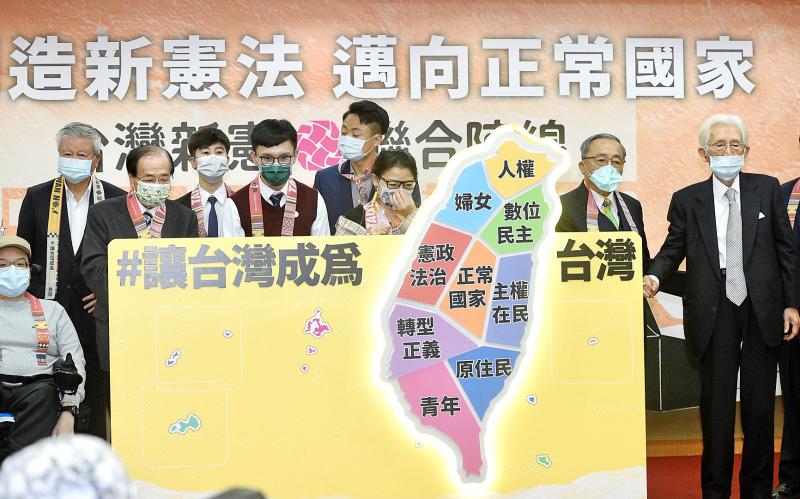Independence advocates yesterday launched the Taiwan New Constitution Alliance to promote drafting a new, localized constitution.
“This is a historic moment for Taiwan. Drafting a new constitution is the most important task Taiwanese face,” veteran independence advocate Koo Kwang-ming (辜寬敏) said at the inaugural event in Taipei.
“Although the Democratic Progressive Party is in power, its authority is based on the Republic of China [ROC] Constitution, which has no connection to Taiwan,” said the 95-year-old Koo, a former presidential adviser.

Photo: George Tsorng, Taipei Times
“The historic task of drafting a new constitution depends on efforts by all Taiwanese,” Koo said. “A constitution for a sovereign, independent Taiwan is not just for the benefit of those of us alive today, but also for that of our children and grandchildren.”
“The ROC Constitution was drafted in and for China, by representatives of the Chinese Nationalist Party [KMT],” said Lee Hung-hsi (李鴻禧), constitutional expert and law professor at National Taiwan University, adding that a new constitution for Taiwan should have been drafted much earlier.
Representatives of the Taiwan New Constitution Foundation, which is chaired by Koo, read out a proclamation on the need for a new constitution, saying: “When provisions in the ROC Constitution are in conflict with the wishes of Taiwanese and their pursuit of happiness, people have the right to a new constitution.”
The ROC Constitution was ratified during a National Constituent Assembly meeting in Nanjing, China, in 1946, they said.
“Taiwanese were not involved in the process of drafting or ratifying it, and were never asked for consent,” they said. “It was imposed on Taiwan, but later was suspended as the KMT placed the nation under martial law.”
“In the decades before Taiwan’s democratization started in the 1990s, Taiwanese were not granted the rights stipulated in the Constitution, such as the freedoms of expression, assembly and the press,” they said.
“Taiwanese only had a minimal say at the local level, while Mainlanders held all relevant positions in the central government, including as lawmakers who were not elected by the public,” they added.
“The ROC Constitution is dead and exists in name only. As the constitution of China, it has been superseded by the People’s Republic of China constitution,” they said.
A new constitution would omit the obsolete provisions in place and better represent the reality of two separate entities on both sides of the Taiwan Strait, they said.
“A new constitution would do away with the myth of a unification with China,” they said. “It would be an expression of the Taiwanese public’s will for self-determination and safeguard their dignity.”

‘DENIAL DEFENSE’: The US would increase its military presence with uncrewed ships, and submarines, while boosting defense in the Indo-Pacific, a Pete Hegseth memo said The US is reorienting its military strategy to focus primarily on deterring a potential Chinese invasion of Taiwan, a memo signed by US Secretary of Defense Pete Hegseth showed. The memo also called on Taiwan to increase its defense spending. The document, known as the “Interim National Defense Strategic Guidance,” was distributed this month and detailed the national defense plans of US President Donald Trump’s administration, an article in the Washington Post said on Saturday. It outlines how the US can prepare for a potential war with China and defend itself from threats in the “near abroad,” including Greenland and the Panama

A wild live dugong was found in Taiwan for the first time in 88 years, after it was accidentally caught by a fisher’s net on Tuesday in Yilan County’s Fenniaolin (粉鳥林). This is the first sighting of the species in Taiwan since 1937, having already been considered “extinct” in the country and considered as “vulnerable” by the International Union for Conservation of Nature. A fisher surnamed Chen (陳) went to Fenniaolin to collect the fish in his netting, but instead caught a 3m long, 500kg dugong. The fisher released the animal back into the wild, not realizing it was an endangered species at

The Chinese Nationalist Party (KMT) is maintaining close ties with Beijing, the Democratic Progressive Party (DPP) said yesterday, hours after a new round of Chinese military drills in the Taiwan Strait began. Political parties in a democracy have a responsibility to be loyal to the nation and defend its sovereignty, DPP spokesman Justin Wu (吳崢) told a news conference in Taipei. His comments came hours after Beijing announced via Chinese state media that the Chinese People’s Liberation Army’s Eastern Theater Command was holding large-scale drills simulating a multi-pronged attack on Taiwan. Contrary to the KMT’s claims that it is staunchly anti-communist, KMT Deputy

The High Prosecutors’ Office yesterday withdrew an appeal against the acquittal of a former bank manager 22 years after his death, marking Taiwan’s first instance of prosecutors rendering posthumous justice to a wrongfully convicted defendant. Chu Ching-en (諸慶恩) — formerly a manager at the Taipei branch of BNP Paribas — was in 1999 accused by Weng Mao-chung (翁茂鍾), then-president of Chia Her Industrial Co, of forging a request for a fixed deposit of US$10 million by I-Hwa Industrial Co, a subsidiary of Chia Her, which was used as collateral. Chu was ruled not guilty in the first trial, but was found guilty